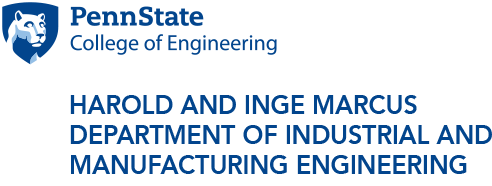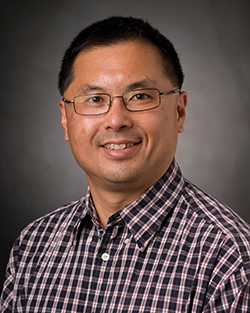Three IME faculty members receive promotions
6/2/2016
UNIVERSITY PARK, Pa. — Ling Rothrock and Uday Shanbhag, both associate professors, and Guodong (Gordon) Pang, assistant professor, have been promoted within the Harold and Inge Marcus Department of Industrial and Manufacturing Engineering (IME), effective July 1.
A member of the IME faculty since 2002, Rothrock was promoted to full professor. He currently oversees the Human Performance, Assessment and Modeling Lab, which focuses on the understanding of operator constraints, abilities and goals in the context of dynamic task environments and the design of systems to facilitate effective and efficient man-machine interactions.
Rothrock is currently the editor of Human Factors and Ergonomics in Manufacturing & Service Industries, and associate editor for the Institute of Electrical and Electronics Engineers’ Transactions on Human Machine Systems and the Institute of Industrial and Systems Engineers’ IIE Transactions on Occupational Ergonomics and Human Factors.
His research interests include human-in-the-loop discrete event simulations, display visualization and human-machine performance evaluation.
Rothrock earned his doctoral and master’s degrees in industrial engineering from the School of Industrial and Systems Engineering at Georgia Tech, and a B.S. in Applied Mathematics from the Florida Institute of Technology.
Shanbhag, who was also promoted to full professor, joined the department in 2012 from the University of Illinois at Urbana Champaign, where he was first an assistant professor and subsequently a tenured associate professor.
He is the co-director of the Initiative for Sustainable Electric Power Systems, an interdisciplinary research initiative that aims to address the intricacies and challenges that emerge from the design, planning, and operation of the next generation of power systems and markets.
Shanbhag was awarded the A.W. Tucker Prize by the Mathematical Programming Society, and also earned the National Center for Supercomputing Applications Faculty Fellowship in 2006. He was the co-recipient of the Computational Optimization and Applications Best Paper Award (2007) and the Best Theoretical Paper Award at the Winter Simulation Conference (2013). Additionally, he was awarded the National Science Foundation Faculty Early Career Development Award in 2012 from the operations research program within the engineering directorate.
His research interests lie in the development of analytical tools and scalable computational schemes for optimization, equilibrium and game-theoretic problems, with a focus on addressing uncertainty, non-smoothness and non-convexity. Much of his work finds application in the context of power systems and markets where his focus has been on examination of strategic behavior in wholesale power markets and the development of algorithms for resolving large-scale operational problems.
Shanbhag received a Ph.D. from the Department of Management Science and Engineering with a concentration on operations research from Stanford University in 2006. He also holds master’s degrees and an undergraduate degree from the Massachusetts Institute of Technology, Cambridge and the Indian Institute of Technology, Bombay, respectively.
Pang, who came to Penn State in 2010, was promoted to associate professor.
Pang has received several awards including: the Marcus Department’s Outstanding Faculty Award (2016), the Harold and Inge Marcus Career Professorship (2010-2014) and the Class of 1988 Doctoral Fellowship at Columbia University (2009-10). Additionally, he was a finalist in the Institute for Operations Research and the Management Junior Faculty Interest Group Paper Competition (2014).
Pang’s research interests are in applied probability, stochastic control, stochastic networks and queueing systems. He works with applications in service systems (customer contact centers, health care), energy systems and telecommunications. He also has broad interests in financial engineering (econometrics), risk theory, statistics, simulation and numerical methods.
Pang earned his Ph.D. in Operations Research from Columbia University in 2010.






